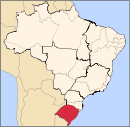Picada Café | |
|---|---|
 | |
 Location within Rio Grande do Sul | |
| Coordinates: 29°27′15″S 51°08′11″W / 29.4542°S 51.1364°W | |
| Country | |
| State | Rio Grande do Sul |
| Population (2020 [1]) | |
| • Total | 5,738 |
| Time zone | UTC−3 (BRT) |
Picada Café or Kaffeeschneiss in the local German dialect (i.e. Riograndenser Hunsrückisch) is a municipality in the state of Rio Grande do Sul, Brazil. It is located around 80 kilometers from the state capital of Porto Alegre.
YouTube Encyclopedic
-
1/3Views:433372915
-
Morro do Vento e as Bruxas de Picada Café RS
-
Morro do Vento - Picada Café/RS - XT660R, Z300, Twister e Fazer 150
-
Show de Gian e Giovani encerra Feira do Livro em Picada Café
Transcription
Economy
The local economy depends largely on small farming;[2] and increasingly on national (internal) tourism which in turn revolves around its Germanic roots and traditions, perceived as exotic.
Minority language
Since its foundation in 1840s[3] and from its pioneering days onward, the Riograndenser Hunsrückisch language, a Brazilian variety of German largely based on the Rhine Franonian, has been present in this community.
There are many other municipalities with this bilingual profile throughout the state. In 2012 the state chamber of deputies voted unanimously in favor of recognizing this Germanic dialect an official historical culture good to be preserved.[4][5]
See also
References
- ^ IBGE 2020
- ^ A História Agrária da Picada do Café por Sinésio Geromir Klauck, curso de planejamento e gestão para o desenvolvimento rural - Plageder, Departamento de Ciências Econômicas, Faculdade de Ciências Econômicas, Universidade Federal do Rio Grande do Sul. Porto Alegre, Aug. 1, 2011.
- ^ Prefeitura Municipal de Picada do Café: Histórico (Website accessed on Nov. 10, 2013).
- ^ LEI 14.061 - DECLARA INTEGRANTE DO PATRIMÔNIO HISTÓRICO E CULTURAL DO ESTADO DO RIO GRANDE DO SUL A “LÍNGUA HUNSRIK”, DE ORIGEM GERMÂNICA
- ^ LEI Nº 14.061, de 23 de julho de 2012 - Declara integrante do patrimônio histórico e cultural do estado do Rio Grande do Sul a língua hunsrik, de origem germânica





